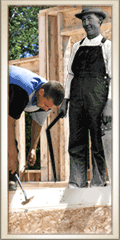|
|||
|
Now Over 25,000 Categorized Links! Family Census Data Directory |
|
|||
|
Now Over 25,000 Categorized Links! Family Census Data Directory |
|
|

|
1910 CensusGo to available databases for 1910The 1910 census was begun on 15 April 1910. The enumeration was to be completed within thirty days, or two weeks for communities with populations of more than five thousand. Questions Asked in the 1910 Census The 1910 census schedules record each personís name and relationship to the head of household; sex; color or race; age at last birthday; marital status; length of present marriage; if a mother, number of children and number of living children; birthplace and parentsí birthplaces; if foreign born, year of immigration and citizenship status; language spoken; occupation; type of industry employed in; whether employer, employee, or self-employed; number of weeks unemployed in 1909 if applicable; ability to read and write; if attended daytime school since 1 September 1909; if home was rented or owned; if owned, whether free or mortgaged; if home was a house or a farm; if a veteran of the Union or Confederate army or navy; if blind in both eyes, and if deaf and dumb. The Indian schedule also recorded the tribe and/or band. Research Tips for the 1910 Census The quality of the microfilming of the 1910 census seems especially poor when compared to other census schedules. Overexposure in microfilming schedules for Mississippi, for example, rendered hundreds of pages illegible. Additionally, the omission rate in the 1910 Miracode/Soundex appears to be greater than in most other indexes. In many cases, individuals not indexed are indeed present in the census schedules, so it is especially advisable for researchers to continue a search in the actual schedules even though a name fails to show up in an index. The 1910 census, while not providing as much precise information as the 1900 census (such as exact birth month, years married, and number of children born to the mother), is still a good tool for determining approximate dates and places to search for marriage records, birth and death records of children, and the marriages of children not listed. The 1910 census sometimes makes it possible to verify family traditions, identify unknown family members, and link what is known to other sources, such as earlier censuses, naturalization records (especially declarations of intent to become citizens), school attendance rolls, property holdings, and employment and occupational records. These records will also verify Civil War service, trace and document ethnic origins, and locate military and naval personnel in hospitals, ships, and stations and those stationed in the Philippines, Alaska, Hawaii, and Puerto Rico. Go to available databases for 1910
|
|